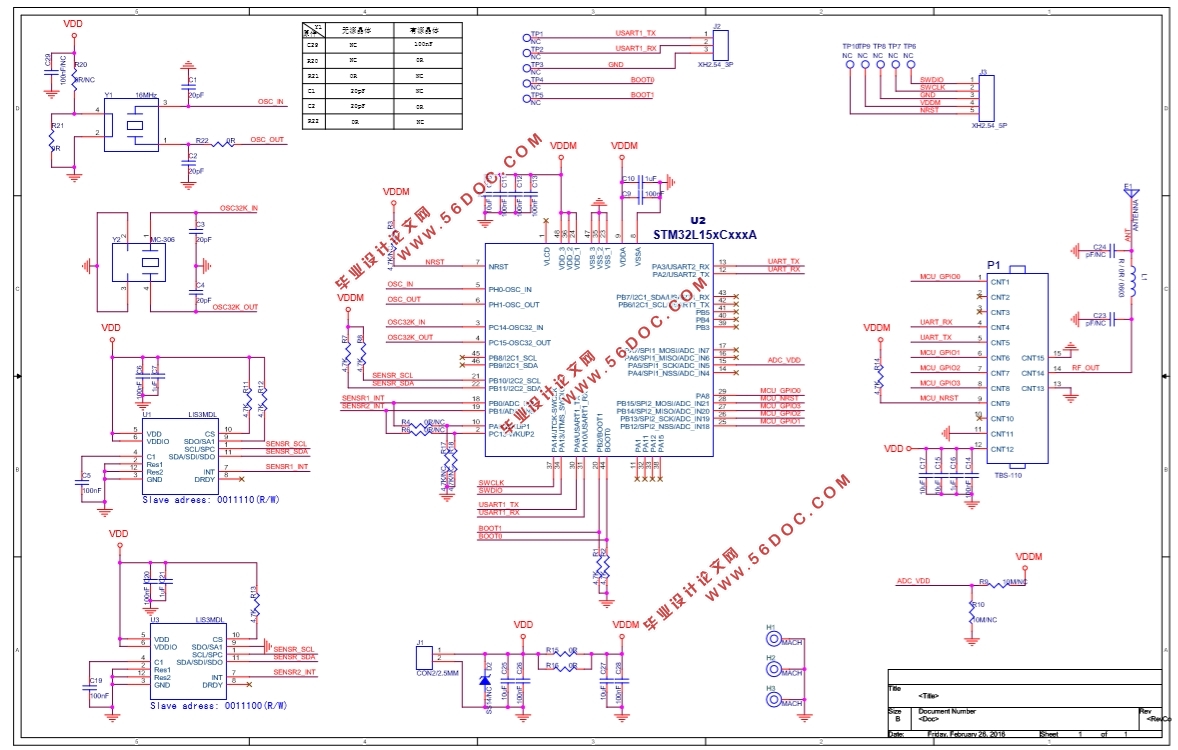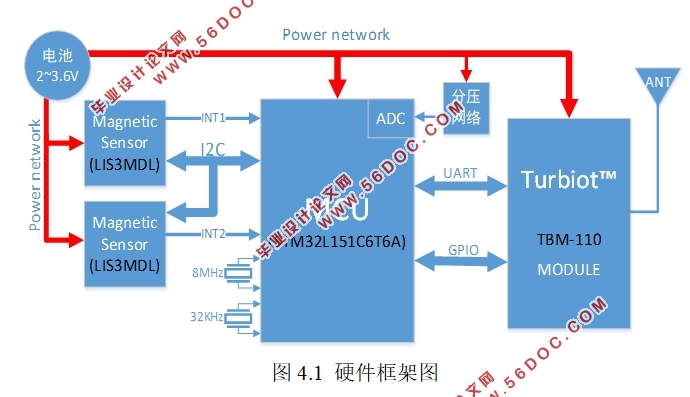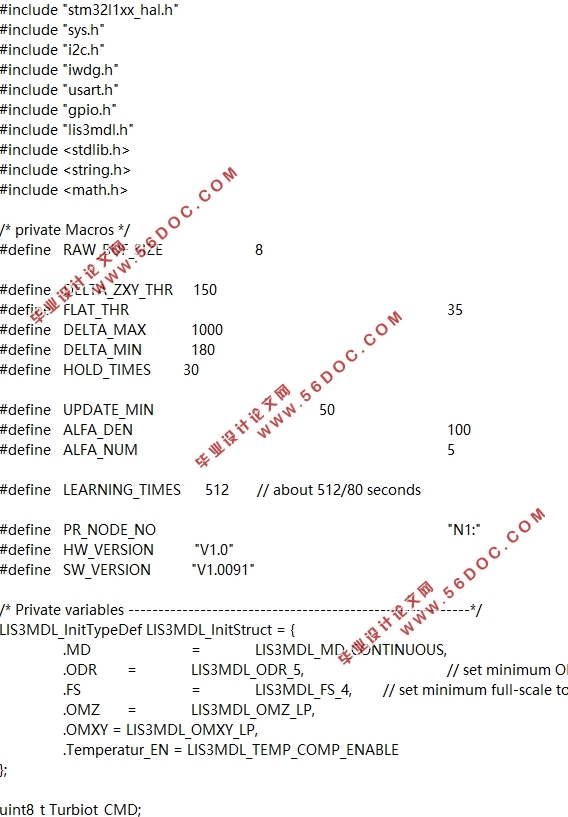基于单片机的地磁检测系统的设计(附程序代码,硬件设计图)(任务书,开题报告,中期检查,阶段性报告,外文翻译,论文20000字,程序代码,硬件设计图)
摘要
紧跟着我国经济的繁荣壮大,汽车工业也有相应的提升。然而在汽车数目日益膨胀的同时,国家的停车位问题却没有得到有效地解决,从而影响了汽车的高效使用,也妨碍了人们的正常出行。由于许多商业化区域的停车位稀缺而导致路旁停车杂乱,不仅妨碍了正常的交通,而且由于收费不规范而产生诸多纷争。近年来,车辆检测技术发展迅速,目前使用的最多的是线圈检测,但一种新型技术—无线地磁检测由于其体积小,寿命长,易于安装等优点得到了行业的普遍认可,具有不错的发展前景。
本文设计了一个应用于路旁停车的车辆检测系统。通过分析传感器测量到的地磁信号对停车位状态进行判断,由此记录停车时长,从而实现自动收费功能,而且通过车辆信息管理平台在APP上对停车位信息做实时发布,司机通过查询APP数据来决定车辆停靠位置,实现了车辆的导引作用,最大程度地提高了停车位的使用率。
作者的主要研究工作如下:
(1)设计与实现了一款低功耗地磁检测系统。通过对芯片选型及软件设计实现了产品的低功耗工作,根据LIS3MDL芯片的中断阈值触发功能,大部分时间内将MCU置于休眠状态,只有在地磁信号产生变化时,通过地磁传感器的中断唤醒MCU进行工作;
(2)设计与实现了一种地磁检测算法。通过比较当前稳态数据与基值数据,根据其差值的大小采取不同的数据处理方式,根据不同的参数来判断停车位状态。这种方法结合了动态过程及静态数据,根据不同的差值大小采用不同的判断方法,使得判别过程简洁且精确可信;
(3)设计了一个自动收费系统。在车位检测到车辆之后,停车位的收费人员到达现场,将车辆扫描并与缴费APP相连,车主便可通过APP查询收费状态,当车辆离开时,APP自动扣除停车费用。
通过对无线地磁检测器进行实际的道路测试,在较长时间内对不同车型的停车数据进行分析实验,发现该检测器的精度达到95%以上,这说明本文提出的无线地磁检测器检测精度高,且具有低功耗,体积小,易于安装的优点。本文中提出的地磁车辆检测算法为有效解决停车难问题提供了一种解决思路。
关键词:车辆检测;地磁传感器;无线传感网络
Abstract
With the prosperity of China's economic, auto industry has obtained the great development accordingly. However, while per capita car ownership in the country is growing, the parking problem has not been effectively solved. Parking has become a big problem in our life. Due to many commercial areas have not much parking space for cars that many cars park desultorily in the roadside, which hindered the normal traffic. Meanwhile the result of the charging without specification is a lot of disputes. In recent years, vehicle detection technology has developed rapidly. The most popular of them is the loop vehicle detector, but a kind of new technology - wireless magnetic detector get general recognition of the industry because of its small volume, long service life and easy installment , thus it will have a good development prospect.
In this paper, an road vehicle detection system applied to the parking space has been designed. Parking space state can be gotten through the analysis of the magnetic signal of sensor. By the same way, it records the parking time, so as to realize the automatic charging function. And through the vehicle information management platform in the APP to do real-time parking information release, the driver can determine the vehicle parked position by querying the APP data. Accordingly, it has realized the guide function , maximizing the efficiency of the parking space.
The main research works are as follows:
Firstly, this paper has designed and achieved a low-power consumption magnetic signal detector. The low-power performance has been achieved through the selection of chip and design of software. According to the Interruption thresholds trigger function of LIS3MDL,MCU is set to dormant state in the most of time, and it will be awaken by the interruption of magnetic sensor only when the magnetic signal has been changed;
Secondly, this paper has designed and achieved a new kind of magnetic detection algorithm. By comparing the difference value of current flat data and the based data, different data disposal is applied to the situation, thus the station of parking lot can be obtained by some important parameters. This paper has proposed algorithm that combines dynamic process and static data, using different judgment method according to different value, which makes the judgement clear and accurate;
Thirdly, an automatic charging system has been designed. After detected the vehicle on the parking lot, the manager arrived to scan the vehicle and combine the APP with the vehicle. Driver can inquiry the charging station by this APP. When the car leaves the parking lot, APP can deduct expenses automatically.
Through the actual road test of wireless magnetic detector by different models of vehicle in a long time, we found that the precision of the detector can reach more than 95%. This shows that the proposed wireless magnetic detector has many advantages, such as high precision, low-power consumption, small size and easy to install. This paper puts forward a geomagnetic vehicle detection algorithm which can effectively solve the problem of parking difficulty.
KEY WORDS: vehicle detection;magnetic sensor;wireless sensor network




目 录
摘要 I
Abstract II
第1章 绪论 1
1.1 研究来源、背景及目的、意义 1
1.1.1 研究来源 1
1.1.2 研究背景 1
1.1.3 研究目的及意义 2
1.2 车辆检测的国内外研究现状 2
1.3 本文主要研究内容及组织结构 4
1.3.1 论文的主要内容 4
1.3.2 论文的组织结构 4
第2章 地磁检测的关键理论与技术 6
2.1 车辆检测技术 6
2.1.1 车辆检测技术简介 6
2.1.2 车辆检测器的应用 7
2.2 地磁检测理论 8
2.2.1 地球磁场介绍 8
2.2.2 车辆检测原理 8
2.3 地磁传感器 10
2.3.1 传感器的对比 10
2.3.2 异向磁阻传感器 11
2.4 车辆检测算法 12
第3章 地磁检测系统总体方案设计 15
3.1 需求分析 15
3.1.1 低功耗分析 15
3.1.2 检测可行性分析 16
3.1.3 抗干扰性分析 18
3.2 系统总体设计方案 20
3.2.1 总体结构框架 20
3.2.2 系统方案设计 21
第4章 地磁检测系统软硬件的设计与实现 23
4.1 硬件设计 23
4.1.1 供电电源模块 23
4.1.2 地磁传感器模块 24
4.1.3 MCU模块 26
4.1.4 TBM-110无线收发模块 27
4.2 软件设计 28
4.2.1 软件总体设计 28
4.2.2 数据采集准备 29
4.2.3 算法流程分析 30
4.2.4 软件实现 33
第5章 系统调试与运行 36
5.1 测试过程 36
5.2 结果分析 37
第6章 总结与展望 39
6.1 总结 39
6.2 展望 40
参考文献 41
致 谢 42
|









